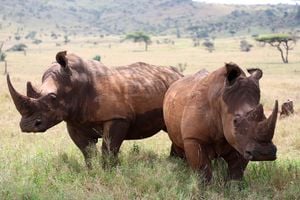Alarm bells ring as wetlands vanishing at high rate

Local tourists at Dunga wetland boardwalk gallery in Kisumu.The birdwatching site has been neglected by the County Government and the management fear it could collapse.
What you need to know:
- Kenya is already taking steps to reverse the tide with the government's Wetlands Restoration Strategy.
- However, more efforts and collaboration with all hands on deck will facilitate a quicker restoration.
The reality of Kenya's wetlands woven from lush papyrus reeds, teeming fish and vibrant birdlife ecosystems is today as precious as it is imperilled.
As Kenya marked this year’s World Wetlands Day on February 2, a sobering truth hung heavy – nearly 90 per cent of the world's wetlands, including Kenya's, have vanished since the 1700s, according to the World Wildlife Fund (WWF).
We're losing these vital landscapes three times faster than forests, a statistic that demands our immediate attention, says the WWF-K report.
But why are these marshlands, swamps, and bogs disappearing? The culprits lurk in both the realm of nature and human activities.
Natural events like droughts and floods have taken their toll, slowly but notably drying these areas. However, the primary driver of wetland decline lies squarely in the hands of human beings. One major threat is land conversion, which is driven by a burgeoning population and the allure of agriculture and development.
This is draining and filling wetlands for farms, houses, and industries, as highlighted by Environment, Climate Change and Forestry Cabinet Secretary Soipan Tuya while unveiling Kenya's Wetlands restoration strategy in May 2023.
This scenario, according to the CS, not only destroys the habitat of countless species but also disrupts the natural water cycle, leading to floods and droughts in the long run.
Pollution is another insidious enemy. Untreated sewage, agricultural runoff laden with chemicals and industrial waste find their way into wetlands, poisoning the water and suffocating life within. This contamination impacts not just the ecosystem but also the communities that depend on clean water from these sources.
A joint report titled Scientific Report on Pesticides in the Kenyan Market, collaborated under the Pest Control Products Board in 2021, revealed that elevated residues of agrochemicals are present in water sources used for domestic, livestock and irrigation purposes, in foodstuffs and animal products, and human samples like breast milk.
Climate change adds another layer of complexity. Rising temperatures and erratic rainfall patterns exacerbate droughts and floods, further stressing already fragile wetlands, as noted by the United Nations Environment Programme.
The delicate balance of these ecosystems is easily tipped, leading to irreversible damage.
The consequences of losing our wetlands are far-reaching.
These natural sponges play a critical role in filtering water, preventing floods and mitigating droughts, according to the Ramsar Convention on Wetlands.
They are breeding grounds for fish, birds and other wildlife, crucial for food security and biodiversity, as emphasised by WWF. They even store carbon, helping to combat climate change.
So, what can we do?
The World Wetlands Day marked recently serves as a stark reminder that the time for action is now.
Kenya is already taking steps to reverse the tide with the government's Wetlands Restoration Strategy. However, more efforts and collaboration with all hands on deck will facilitate a quicker restoration.
Community-led initiatives like reed harvesting projects and conservation programmes, when well planned and executed, will make a huge difference.
Individual action is equally important. We can all be wetland warriors by reducing our water footprint, supporting sustainable agriculture and raising awareness about the importance of these ecosystems are crucial steps.
We can urge our elected officials to prioritise wetland conservation and hold polluters accountable. Healthy wetlands are not just about protecting nature; they are about protecting ourselves.




